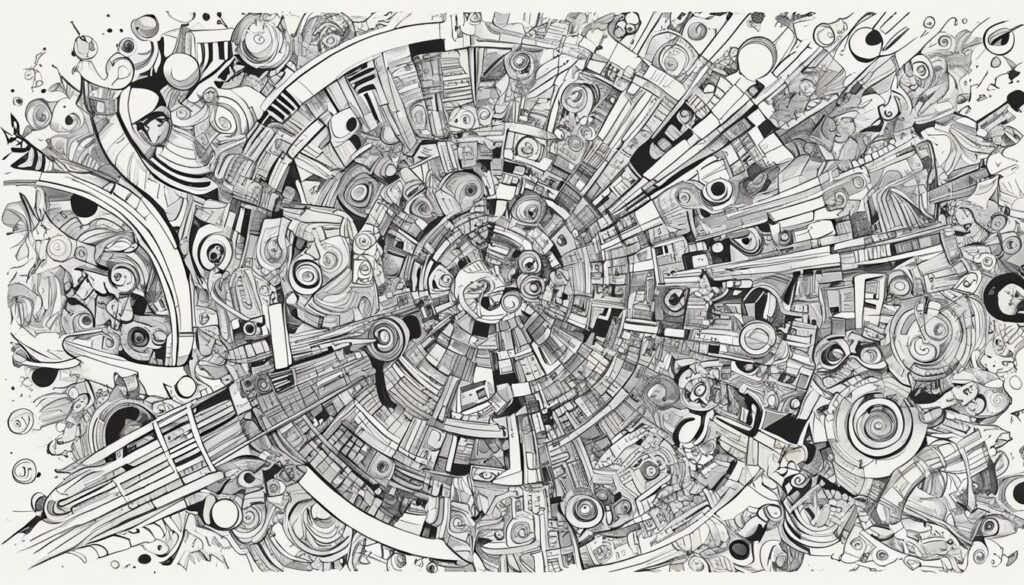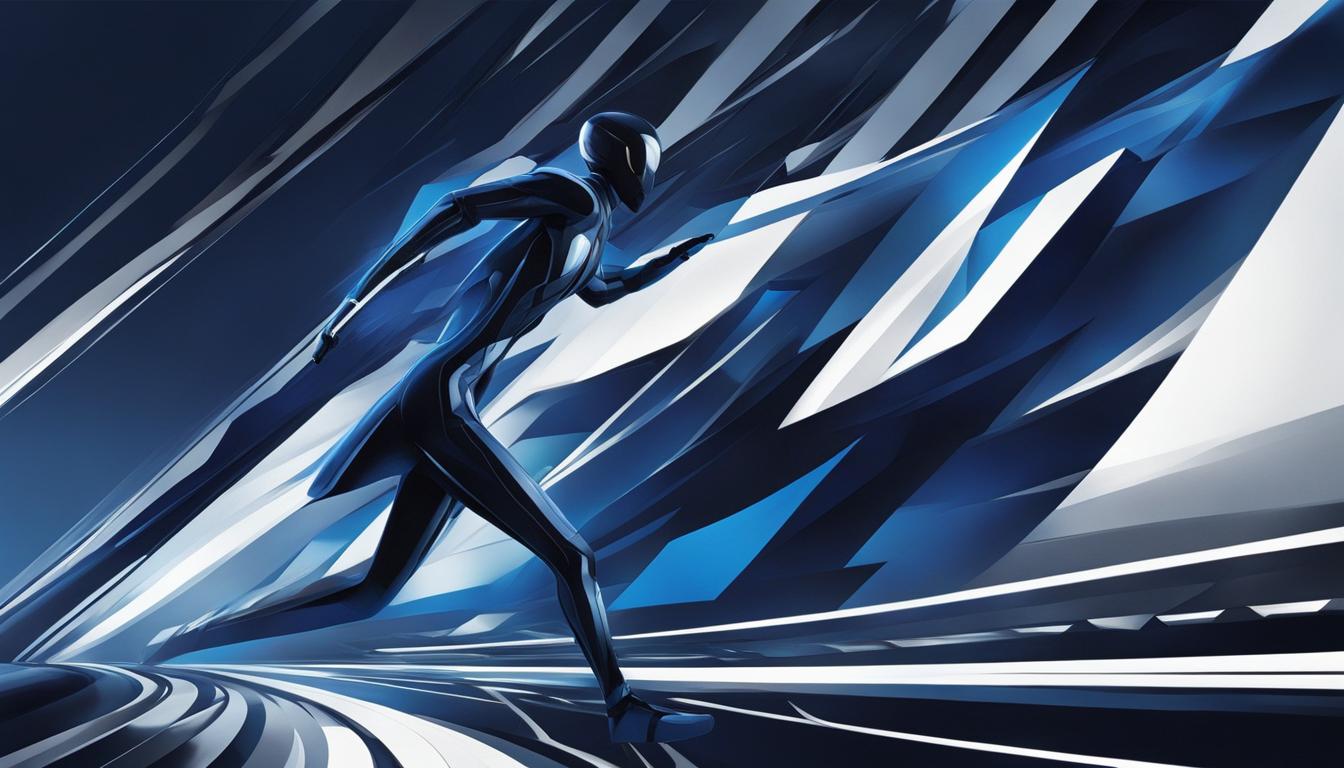Are you looking for a thought-provoking and captivating reading experience that explores themes of identity and the future self? Look no further than Elizabeth Moon’s The Speed of Dark. In this book summary, we will explore the intricacies of the plot, the multifaceted characters, and the thematic explorations that make this novel a standout work of contemporary science fiction.
Elizabeth Moon is an accomplished author with a rich background in science and technology. Her expertise in these fields shines through in the intricate world-building of The Speed of Dark.
Key Takeaways
- The Speed of Dark explores themes of identity and the future self through the struggles of a protagonist who questions his sense of self in a world where medical advancements can alter one’s personality.
- Elizabeth Moon’s extensive background in science and technology allows her to craft a highly immersive futuristic setting.
- The novel’s well-crafted plot and multifaceted characters contribute to its overall impact and lasting legacy.
- The Speed of Dark has received critical acclaim and resonated with readers, inspiring discussions around neurodiversity and the ethical implications of medical advancements.
- If you enjoyed The Speed of Dark, we recommend exploring other works of science fiction that grapple with similar themes of identity, technology, and morality.
About the Author – Elizabeth Moon
Elizabeth Moon is an American author born in 1945 in McAllen, Texas. She attended Rice University and graduated with a degree in history. She then served in the United States Marine Corps for several years, an experience that heavily influenced her writing.
Moon’s literary achievements are impressive, including multiple prestigious awards such as the Nebula Award and the Hugo Award, both of which she won for her science fiction writing. She has authored over 20 novels and numerous short stories, with her works spanning across genres such as science fiction, fantasy, and historical fiction.
Throughout her career, Moon has also been recognized for her talented writing style, which has been described as powerful, evocative, and thought-provoking. Whether exploring complex themes or creating captivating characters, Moon’s words expertly capture the imagination of her readers.
Introduction to The Speed of Dark
The Speed of Dark, written by Elizabeth Moon, is a science fiction novel that explores the consequences of futuristic medical advancements. The book is set in a world where autism can be treated with a ground-breaking technology, but the experimental procedure comes with a catch. It threatens to change the identity of the recipients, including the protagonist, Lou Arrendale. Through Lou’s journey, readers are taken on a thought-provoking exploration of identity, neurodiversity and the ethical implications of medical advancements.
The novel introduces a cast of compelling characters, each with their own perspective and conflicts. Lou, who has been living with autism his entire life, is particularly affected by the advanced technology. In this world, he struggles to navigate his sense of self through rapidly changing circumstances. Other primary characters, such as his boss and love interest, also grapple with their own struggles of identity and morality.
Through the immersive setting and intricate plot, The Speed of Dark invites readers to reflect on the deeper questions of being human in a world of rapidly evolving technology.
Plot Summary
Set in a not-too-distant future, The Speed of Dark follows the life of Lou Arrendale, a high-functioning autistic man who excels as an analyst at a pharmaceutical firm known as HIBA.
Lou faces a life-changing decision when HIBA offers him the opportunity to undergo a procedure that could cure his autism and help him “fit in” with society. As he weighs the pros and cons of the experimental treatment, Lou also grapples with personal relationships, a potential romance, and a workplace controversy.
Elizabeth Moon weaves a complex narrative that delves into the nuances of identity, humanity, and self-acceptance in a world where medical advancements can transform one’s sense of self. The Speed of Dark offers a unique perspective on the struggles faced by those with marginalized identities, while also posing tough moral questions that challenge readers to examine their own attitudes towards neurodiversity and personal authenticity.
Will Lou undergo the procedure that could change his life, but at what cost? Find out in The Speed of Dark.
Character Analysis
In The Speed of Dark, Elizabeth Moon creates a cast of complex characters whose stories unravel throughout the novel, bringing different perspectives and insights into the central theme of identity.
Lou Arrendale: The protagonist of the novel, Lou, is an individual on the autism spectrum who works for a pharmaceutical company. His routine and his life get disrupted when he hears about an experimental treatment that could change his sense of self and alter his perception of the world. Through Lou’s journey, Moon explores the intricacies of neurodiversity and the moral and ethical dilemmas posed by medical advancement.
Marjory Harris: Lou’s manager, Marjory, is a fierce and determined woman who advocates for Lou’s rights in his workplace. She challenges the systemic biases and stereotypes that Lou and other individuals on the spectrum face daily, highlighting the importance of empathy and understanding.
| Character | Motivations | Struggles | Relationships |
|---|---|---|---|
| Lou Arrendale | To maintain his routine To determine his identity |
To navigate a world that doesn’t understand him | Margie, Mr. Crenshaw, Dakota, Loraine, etc. |
| Marjory Harris | To challenge the status quo To advocate for her employees |
To combat systemic biases and stereotypes | Lou, other employees with disabilities |
| Mr. Crenshaw | To resolve Lou’s employment status To maintain the company’s reputation |
To navigate legal and professional constraints | Lou, Margie, Dr. Fornum, other employees |
Mr. Crenshaw: Lou’s boss at the pharmaceutical company, Mr. Crenshaw, is a complicated character whose motivations and actions are sometimes difficult to parse. He struggles between prioritizing Lou’s rights and ensuring the company’s success, highlighting the impact of corporate power and responsibility on individuals.
“Crenshaw wants to help me. Crenshaw wants not to want to help me.”
The characters in The Speed of Dark are not caricatures or archetypes but fully realized individuals whose experiences and relationships add depth and nuance to the exploration of identity. Through their interactions, Moon showcases the complexity of human emotions and actions, demonstrating how identity is shaped not only by individual characteristics but also by social, historical, and institutional factors.

Themes Explored
The Speed of Dark delves into several prominent themes, with a particular focus on the exploration of identity in a world where technology can drastically alter one’s sense of self. Throughout the novel, we see how the characters struggle with the consequences of experimental treatments that offer both benefits and risks to their identities.
“I am who I am; no technology can change that,” Lou said. “Let’s not forget that autism has its advantages.”
The ethical and moral questions raised by the narrative add depth to this exploration, prompting readers to reflect on the impact of technological advances on our understanding of ourselves.
Through its thought-provoking narrative, The Speed of Dark shows us how crucial our sense of identity is to our lives and communities, and how arbitrary and fleeting it can be when exposed to external forces.
Writing Style and Tone
Elizabeth Moon’s writing style in The Speed of Dark is characterized by its eloquence and clarity, creating a dynamic and compelling narrative that draws readers in from the first moment. Moon’s skillful use of language and narrative techniques enhances the overall reading experience, capturing the essence of the story’s themes with finesse and subtlety.
One of the standout features of Moon’s writing is her vivid descriptions, creating vivid imagery that allows readers to fully immerse themselves in the novel’s futuristic setting. Her choice of language is deliberate, precise, and thought-provoking, inviting readers to contemplate the complex themes and ethical questions raised by the narrative.
The tone of The Speed of Dark is introspective and contemplative, encouraging readers to reflect on their own beliefs and values, especially concerning neurodiversity and personal identity. Moon’s provocative and challenging style distinguishes the work from other literary offerings in the same genre, creating a wholly unique reading experience.
The Speed of Dark’s writing style and tone have been widely praised by readers and critics, cementing its legacy as a thought-provoking and genre-defying work of literature.
Reception and Awards
The Speed of Dark by Elizabeth Moon garnered widespread critical acclaim upon its release, earning praise for its thought-provoking exploration of identity in a futuristic world.
“The Speed of Dark is a powerful, complex book that works on many levels…Elizabeth Moon’s writing is always deft, witty, and insightful, and this book is no exception…Utterly believable and truly thrilling.”
-Garner Dozois, Locus Magazine
Other notable publications, such as The New York Times and Publishers Weekly, also praised Moon’s writing and her ability to grapple with challenging themes. Readers also resonated with Moon’s poignant exploration of identity and the future self, sparking discussions and reflections on the nature of humanity and consciousness.
| Awards | Year |
|---|---|
| Hugo Award for Best Novel | 2004 |
| Arthur C. Clarke Award Nominee | 2003 |
| Nebula Award Nominee | 2003 |
| James Tiptree Jr. Award Winner | 2004 |
As evidenced by its numerous accolades and enduring popularity, The Speed of Dark remains a powerful and relevant work of contemporary science fiction.
Cultural Significance
The Speed of Dark is a remarkable novel that has had a significant cultural impact. Elizabeth Moon’s exploration of identity and neurodiversity has contributed to a broader discussion about these topics in popular culture and academic circles. The novel has challenged readers to consider the ethical implications of medical advancements and technology, and to confront their own biases and assumptions about individuals with autism.
One of the most striking aspects of The Speed of Dark is its portrayal of people on the autism spectrum as complex, multidimensional individuals with their own unique perspectives and experiences. This representation has helped to raise awareness about autism and promote greater acceptance and understanding of neurodiversity.
The themes and issues addressed in The Speed of Dark continue to be relevant today, and the novel has inspired many other works of literature and media to explore similar topics. Its impact on popular culture and literature is significant, speaking to the enduring power of storytelling to shape our perceptions and understanding of the world.
“Identity and neurodiversity are complex issues that require nuanced and thoughtful exploration. The Speed of Dark offers a powerful and engaging narrative that challenges readers to think more deeply about these important topics.”

Analysis of the Ending
The ending of The Speed of Dark is a pivotal moment in the novel, encapsulating its central themes of identity, acceptance, and overcoming societal norms. At the onset of the novel, protagonist Lou Arrendale struggles to balance his desire for acceptance with his reluctance to undergo an experimental treatment that could change his autistic identity. As the story progresses, Lou learns to embrace his differences and accept himself for who he is.
The ending of the novel sees Lou facing a crucial decision – whether to undergo the experimental treatment or not. After much deliberation and introspection, Lou ultimately decides not to undergo the procedure and to embrace his identity. This decision highlights the theme of self-acceptance and self-love, encouraging readers to embrace their unique characteristics and resist societal pressure to conform.
The ending also underscores the power of choice and autonomy, as Lou asserts his agency and makes a decision that is true to himself. This notion of personal agency is particularly poignant in the context of disability and neurodiversity, where individuals are often marginalized and disempowered.
“Lou Arrendale, a uniquely talented autistic man, wages a poignant and powerful fight to retain his individuality in this moving story of a courageous human being confronting the darkness that threatens to consume him.” – The Washington Post
Comparisons to Other Works
Elizabeth Moon’s The Speed of Dark is a nuanced exploration of identity, technology, and the future self. While it stands out as a unique and thought-provoking work, it can be compared to other literary works that explore similar themes.
Brave New World by Aldous Huxley
Aldous Huxley’s dystopian novel Brave New World also examines the implications of technology on human identity. In both works, the characters struggle with the effects of experimental treatments that alter their sense of self. However, while The Speed of Dark poses complex moral questions, Brave New World takes a more pessimistic view of technology by suggesting that it ultimately corrodes the human spirit.
Borne by Jeff Vandermeer
Jeff Vandermeer’s Borne is another science fiction novel that explores the intersection of identity and technology. Like The Speed of Dark, it features a protagonist who is transformed by an experimental treatment. However, Borne is set in a post-apocalyptic world where the line between human and non-human is blurred, reflecting a more surreal and hallucinatory tone than The Speed of Dark.
“The Speed of Dark is a haunting portrayal of a future that is all too possible, where humanity’s struggle for identity is complicated by rapid technological advancements.”
Personal Reflections
Reading The Speed of Dark was a truly moving experience. As someone who has always been fascinated by the exploration of identity, I was immediately drawn to this novel. Elizabeth Moon beautifully captures the intricacies and challenges of living with autism, and I was deeply moved by the protagonist’s journey to define and embrace his sense of self.
The novel’s exploration of technology and the potential consequences of altering one’s identity was thought-provoking, eliciting a range of emotions from curiosity to fear. The themes of self-discovery, personal growth, and acceptance made this an incredibly impactful read for me.
“The most important thing I’ve learned from this book is that our sense of self is truly invaluable. We must cherish and protect it at all costs.”
The Speed of Dark left a lasting impression on me, reminding me of the power of literature to inspire and illuminate our personal journeys. This is a book that I will continue to reflect on for years to come.
Impact and Legacy
The Speed of Dark has left an indelible impact on the literary world since its publication. Its exploration of identity, ethics, and the future self has inspired readers and writers alike to consider the implications of medical advancements and neurodiversity.
Elizabeth Moon’s novel has influenced subsequent works of literature, including The Curious Incident of the Dog in the Night-Time by Mark Haddon and Born on a Blue Day by Daniel Tammet. Its legacy extends beyond the genre of science fiction and into broader conversations about identity and diversity.
“Elizabeth Moon’s The Speed of Dark is a triumphant exploration into the mysteries and wonders of the human mind. Her prose shimmers with lyrical beauty, and her fierce dedication to crafting complex, empathetic characters is awe-inspiring. This is a timeless classic that will continue to resonate with readers for generations to come.”
The Speed of Dark Impact Timeline
| Year | Event |
|---|---|
| 2002 | The Speed of Dark is published. |
| 2003 | The novel wins the Nebula Award for Best Novel. |
| 2004 | The Speed of Dark is a finalist for the Hugo Award for Best Novel. |
| 2015 | The Speed of Dark is translated into French. |
| 2020 | The novel inspires a panel discussion on neurodiversity at the World Science Fiction Convention. |
The Speed of Dark’s impact and legacy can be felt not only in its critical acclaim and literary awards but in how it has influenced a wide range of cultural and intellectual conversations. It remains a poignant and thought-provoking work that challenges readers to consider what it means to be human.
Recommendations
If you enjoyed the thought-provoking exploration of identity and the future self in The Speed of Dark, here are some other books you might want to add to your reading list:
| Book Title | Author | Similar Themes |
|---|---|---|
| The Curious Incident of the Dog in the Night-Time | Mark Haddon | Neurodiversity, identity, technology |
| Brave New World | Aldous Huxley | Technology, identity, ethics |
| Never Let Me Go | Kazuo Ishiguro | Identity, ethics, medical advancements |
| Do Androids Dream of Electric Sheep? | Philip K. Dick | Identity, technology, ethics, future self |
These books offer similar explorations of the themes present in The Speed of Dark, while also providing unique perspectives and narratives. Each one provides a thought-provoking reading experience that challenges our understanding of identity and the impact of technology on the future self.
Conclusion
In conclusion, this book summary provided an in-depth analysis of The Speed of Dark by Elizabeth Moon. The novel explores the complex themes of identity, technology, and neurodiversity from a unique and thought-provoking perspective, making it a must-read for fans of science fiction and literary fiction alike.
Through Elizabeth Moon’s skillful writing style and rich character development, readers are transported to a futuristic world where the boundaries between self and other are constantly shifting. The novel’s impact on the literary world cannot be overstated, and its significance is sure to continue for years to come.
If you’re looking for a book that challenges your perceptions and provides a profound reflection on what it means to be human, The Speed of Dark is an excellent choice. Its exploration of identity and the future self is sure to leave a lasting impression on any reader.
Thank you for reading this book summary, and we hope it has piqued your interest in exploring The Speed of Dark further.



